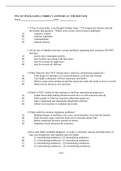Susan harter - Study guides, Class notes & Summaries
Looking for the best study guides, study notes and summaries about Susan harter? On this page you'll find 3 study documents about Susan harter.
All 3 results
Sort by

-
PSY 215 WEEK 6 100% CORRECT ANSWERS AT THE BOTTOM
- Exam (elaborations) • 43 pages • 2022
-
- $13.99
- + learn more
1. “I'll go to class today, even though I'd rather sleep.” “I'll conquer my shyness and ask the teacher that question.” Which is the correct term for these challenges? A) cognitive control B) emotion regulation C) externalization D) internal tenacity 2. All are true of children who have serious problems regulating their emotions EXCEPT that they: A) always have inadequate parents. B) have trouble succeeding with their peers. C) may be excessively aggressive. D) may be exc...

-
Psy_205_week_8 _EXAM_2...100% CORRECT 2020
- Exam (elaborations) • 19 pages • 2022
-
- $11.69
- + learn more
• Question 1 3 out of 3 points The WISC measures , while achievement tests measure . Answer Selected Answer: Correct Answer: academic potential; knowledge of various school subjects • Question 2 3 out of 3 points John and Martha have clear rules and expectations. When a child breaks a rule, they listen to their son or daughter's side of the story before deciding on a consequence. According to Baumrind's parenting styles framework, John and Martha are probably: Answer Sel...

-
PSY_215_WEEK 3 QUESTIONS AND ANSWERS...100% CORRECT
- Exam (elaborations) • 43 pages • 2022
-
- $7.39
- + learn more
teacher that question.” Which is the correct term for these challenges? A) cognitive control B) emotion regulation C) externalization D) internal tenacity 2. All are true of children who have serious problems regulating their emotions EXCEPT that they: A) always have inadequate parents. B) have trouble succeeding with their peers. C) may be excessively aggressive. D) may be excessively anxious. 3. Which behavior does NOT indicate that a child has externalizing tendencies? A)...

How much did you already spend on Stuvia? Imagine there are plenty more of you out there paying for study notes, but this time YOU are the seller. Ka-ching! Discover all about earning on Stuvia


